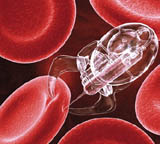
18:30
In the field of physical science, the 20th century is often referred to as the “micro-century” (microelectronics, etc.). However, thanks to the new developments generated by the ceaseless advance of scientific research, the 21st century could well become known as the century of nanoscience and nanotechnology – disciplines that have been developed on the basis of the tenets propounded by Richard Feynman.
Nanoscience, and nanotechnology in particular, refer to the design and manipulation of matter at the atomic or molecular level, and which could have multiple applications in many areas of our production systems, as well as in many other fields, such as biomedicine. In fact, working at nanoscale levels might enable us to manufacture materials and machines through the aforementioned reorganisation of atoms and molecules.
Nanoscience currently has great potential to generate technological innovation and to find viable solutions for many of the challenges we are facing at present, including the very sustainability of human life on planet Earth. In fact, thanks to these new disciplines, major challenges can now be tackled from new perspectives: energy and sustainable materials, borderless information technologies and improvements to biomedicine are the main fields in which nanoscience is making unique contributions. Consequently, it could have a huge impact on society, the economy, the environment and on the very creation of skilled employment.
The Catalan Institute of Nanoscience and Nanotechnology (CSIC-Generalitat of Catalunya- Autonomous University of Barcelona) (ICN2) is one of the research bodies that is closely involved in researching nanoscience and nanotechnology, as well as promoting projects with a great scientific and social impact.
Cycle: SCIENCE ON MONDAY: Nanoscience and Nanotechnology: th future is here!
Organized by: Residència d’Investigadors, CSIC-Delegación en Cataluña, Institut Català de Nanociència i Nanotecnologia (ICN2), Excelencia Severo Ochoa